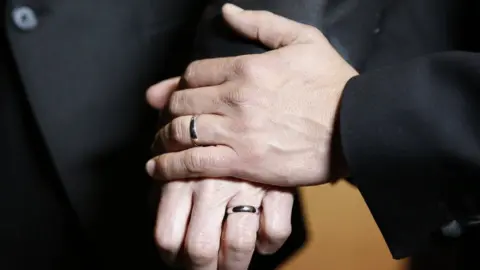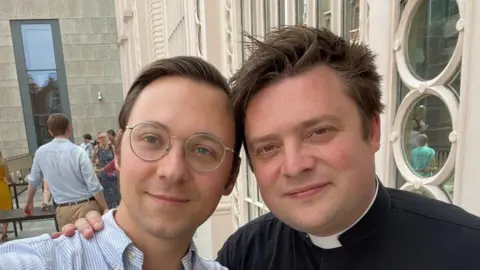Church of England bishops refuse to back gay marriage
 Reuters
ReutersChurch of England bishops have refused to back a change in teaching to allow priests to marry same-sex couples, sources have told BBC News.
They met on Tuesday to finalise their recommendations after five years of consultation and debate on the Church's position on sexuality.
Their proposal will be debated at the Church's equivalent of a parliament - the General Synod - next month.
BBC News spoke to several bishops present at the meeting who said the Church's teaching that Holy Matrimony is only between one man and one woman would not change and would not be put to a vote.
But the Church confirmed "prayers of dedication, thanksgiving or for God's blessing" on same-sex couples will be offered following a civil marriage or partnership.
Same-sex marriage has been legal in England and Wales since 2013. But when the law changed, the Church did not change its teaching.
In 2017, the Church of England began an extended consultation period called "Living in Love and Faith".
In November last year, the Bishop of Oxford became the most senior Church of England bishop to publicly back a change in the Church's teaching. Although a handful of others supported him, they remained in the minority.
The refusal to propose a vote on allowing same-sex marriage is likely to anger campaigners for change within the Church.
Some have already told BBC News they will ask the synod to strike out the bishops' proposals next month.
'Prayers for God's blessing'
The bishops' decision puts the Church of England at odds with its Anglican equivalent in Scotland, The Scottish Episcopal Church, and the Presbyterian Church of Scotland, which both allow same-sex weddings.
The Anglican Church in Wales has provided an authorised service of blessing for gay couples but does not allow same-sex weddings in church.
English bishops will recommend that some "prayers for God's blessing" for gay couples in civil marriages be adopted, the BBC expects.
A controversial church document from 1991 that says clergy in same-sex relationships must remain celibate will be scrapped. And the Church will also issue an apology for the way it has excluded LGBT+ people, BBC News was told by several bishops.
One liberal bishop present at the meeting said there had been "substantial progress".
"It's evolutionary," they said. "It's not the end of the road."
A conservative bishop said: "We're being honest about the fact we're not of one mind in these issues. But we're not going to give up walking together."
'Deep disappointment'
 Charlie Bell
Charlie BellCharlie Bell, 33, and his partner Piotr Baczyk, 27, live in south east London, where Charlie is a priest. They have been waiting to marry until the church allows gay weddings.
He said they felt a "deep disappointment" that the bishops weren't proposing a vote on same-sex marriages.
"It leaves same-sex couples in a bit of a limbo and also as second-class citizens," he told BBC News.
"We're still saying to gay couples that their relationships are less than relationships between people of opposite sexes."
However, he said they would continue to campaign for the Church to change its teaching on marrying gay couples.
He said: "This isn't over. If the bishops think this will resolve the current situation they are very much mistaken."
The Archbishop of York, the Most Rev'd Stephen Cottrell, told BBC Radio 4's Today programme a friend who was gay had died before he was able to have his civil partnership acknowledged in any way by the Church.
"All that now changes," he said. "For the first time, people in same-sex marriages, in civil partnerships, they can come to the Church, their relationships can be acknowledged, dedicated, they can receive God's blessing.
"No, it's not same-sex marriage, it's not everything that everybody wants."
But he said it was a "real step forward" for the Church.
"What I want to emphasise is that with these proposals, people who have entered into a same-sex marriage or who are in a civil partnership will be welcomed into the Church at a service of dedication and acknowledgment of that relationship," he said. "That is a change from where we are at the moment."
The Archbishop of Canterbury, the Most Rev'd Justin Welby, said the position "reflects the diversity of views in the Church of England on questions of sexuality".
He said: "I am under no illusions that what we are proposing today will appear to go too far for some and not nearly far enough for others, but it is my hope that what we have agreed will be received in a spirit of generosity, seeking the common good.
"Most of all I hope it can offer a way for the Church of England, publicly and unequivocally, to say to all Christians and especially LGBTQI+ people that you are welcome and a valued and precious part of the body of Christ."
